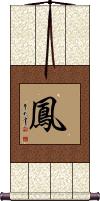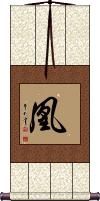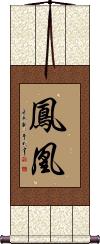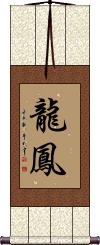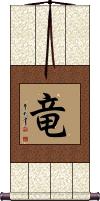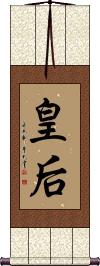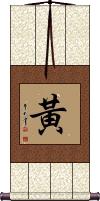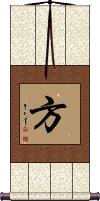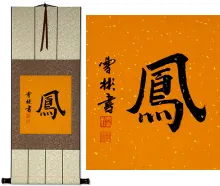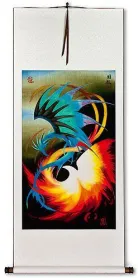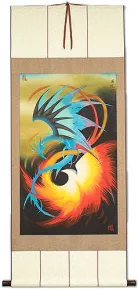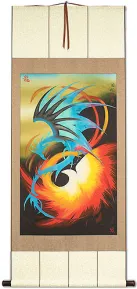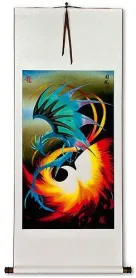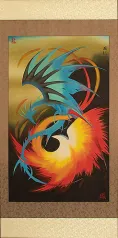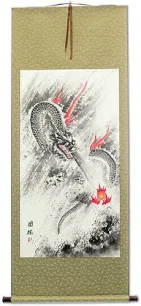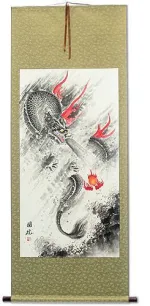Many custom options...
And formats...

Phoenix in Chinese / Japanese...
Buy a Phoenix calligraphy wall scroll here!
Personalize your custom “Phoenix” project by clicking the button next to your favorite “Phoenix” title below...
1. Phoenix
3. Dragon and Phoenix Brings Luck
4. Phoenix Rise from the Ashes
7. Empress
8. Hoang
9. Huynh
11. Phuong
Phoenix
Transliterated Name
Phoenix (male)
鳳 is the simplest way to write “Phoenix” in Chinese. Because the dragon is usually expressed as a single character, when you see “dragon and phoenix” written in Chinese, you'll often see this single-character version.
Please note, this is also the male element of a phoenix, so it also means “male phoenix bird.” However, some Chinese people may argue that the phoenix has a female characteristic, regardless of which character you use.
Phoenix (female)
凰 is another simple way to write “Phoenix” in Chinese. 凰 is the specifically female element of a phoenix, so this is how you write “female phoenix.” 凰 is sometimes used to represent the female empress (many times in history, China was ruled by a woman, in much the same way queens came to power in Europe).
Note that the emperor is always represented as a dragon (not the male version of a phoenix).
If you see yourself as a strong woman, this might be a calligraphy scroll for you to express “woman power” or “powerful woman” in a cool way.
Legendary Phoenix
鳳凰 is the word that translates as “Legendary Phoenix” in Chinese.
This refers to the bird that, according to Chinese folklore, rose from the fiery ashes.
The phoenix and dragon are by far the most famous creatures in Chinese mythology.
Dragon and Phoenix Brings Luck
龍鳳呈祥 is often seen at weddings and other celebrations in China.
It suggests that the dragon and phoenix will bring you auspicious tidings.
The first character is a dragon.
The second is a phoenix.
The third is presents or brings.
And the last means auspicious, propitious, or luck.
Throughout China, the dragon and phoenix are symbols of good fortune. You will see these auspicious figures as decorative symbols on everything from buildings, furniture, wedding costumes, and sculptures in public parks to caskets and items used in ceremonies.
Phoenix Rise from the Ashes
鳳凰涅磐 is a proverb that suggests “Legendary Phoenix rises from the ashes.” It means “Legendary Phoenix [reaches] Nirvana.”
There is a legend in China of a great bird reborn once every 500 years. This bird gathers all the ill will, suffering, desire, and other negative things of the world. The bird then plunges into the fire to burn away all negative things, sacrificing itself in the process (achieving Nirvana, or perhaps allowing others the opportunity to reach Nirvana).
500 years later, the phoenix is reborn from the ashes again, and the cycle repeats.
Dragon and Phoenix
龍鳳 is the simplest way to express “Dragon and Phoenix” in Chinese and Japanese.
This title can be used to represent, “The emperor and empress,” or a metaphor for an outstanding personage.
It should be noted that this is most often used as a given name, “Ryuuhou” in Japanese. It may be read more as a name than by meaning in Japanese.
Dragon / Emperor Symbol
竜 is an alternate form of the dragon.
Still pronounced the same in Chinese, Japanese, and Korean.
This particular Kanji is often associated as an imperial symbol as well as representing the mythical Asian dragon. You may have seen it on the chest or flag of the emperor in old Japanese and Chinese movies.
Note: I would rate this as a non-universal alternate form. The other dragon character is by far more common, and universally understood.
We strongly recommend ![]() if you are looking for the symbol of dragon.
if you are looking for the symbol of dragon.
Empress
皇后 is the title of empress/emperess, the female form of the emperor.
皇后 is used in Chinese, Japanese Kanji, and old Korean Hanja.
While the emperor's reign was for life, if he died, his wife would hold his power. In this case, a woman was the ultimate ruler of the greater part of East Asia (now China) until her death and the succession of the emperor's firstborn son to lead the empire. Numerous times in various Chinese dynasties, an empress took power in this way.
The first character means emperor by itself.
The second character alone can mean “wife of an emperor or king” (the first character clarifies that we are talking about an empress and not a queen). It can also mean sovereign or last offspring, depending on context.
Note: In some books, this word is translated as queen. While only incorrect if you get technical (because an empress is theoretically a higher level than a queen), the meaning is very similar.
皇后 is sometimes used for the title of queen, but more technically, this is the wife of the emperor (a higher level than a queen).
Hoang
黃 is the original Chinese character for the Vietnamese surname Hoang or Hoàng.
This is one of the most common Vietnamese surnames. It originates from the Chinese surname Huang (黃), meaning "yellow," and also used for "phoenix" or "bright/luminous," signifying nobility and leadership, popular across East Asia and among the Vietnamese diaspora, often sharing roots with Korean Hwang and Chinese Wang.
Adopted in Vietnam where it signifies imperial lineage, courage (phoenix), or brightness, with variations like Hoàng (northern) and Huỳnh (southern).
Huynh
黃 is the original Chinese character for the Vietnamese surname Huynh or Huỳnh.
黃 is one of the most common Vietnamese surnames. It originates from the Chinese surname Huang (黃), meaning "yellow," and also used for "phoenix" or "bright/luminous," signifying nobility and leadership, popular across East Asia and among the Vietnamese diaspora, often sharing roots with Korean Hwang and Chinese Wang.
Adopted in Vietnam where it signifies imperial lineage, courage (phoenix), or brightness, with variations like Hoàng (northern) and Huỳnh (southern).
Feng Huang Nie Pan
Phuong
方 is the original Chinese character for the Vietnamese surname Phuong or Phương.
方 means square, upright, or side. In Vietnamese specifically, it can mean "direction" or "phoenix" (rebirth).
In Cambodian there is an unrelated surname, ភួង, meaning "garland necklace (of flowers)" which also romanizes as Phuong. This is probably not the character you want if your name is Cambodian (unless your ancestry is Chinese or you know what you are doing).
This in-stock artwork might be what you are looking for, and ships right away...
Gallery Price: $168.00
Your Price: $92.88
Gallery Price: $300.00
Your Price: $138.88
Gallery Price: $300.00
Your Price: $138.88
The following table may be helpful for those studying Chinese or Japanese...
| Title | Characters | Romaji (Romanized Japanese) | Various forms of Romanized Chinese | |
| Phoenix | 菲尼克斯 | fēi ní kè sī fei1 ni1 ke4 si1 fei ni ke si feinikesi | fei ni k`o ssu feinikossu fei ni ko ssu |
|
| Phoenix (male) | 鳳 凤 | ootori / otori | fèng / feng4 / feng | |
| Phoenix (female) | 凰 | ou / o | huáng / huang2 / huang | |
| Legendary Phoenix | 鳳凰 凤凰 | houou / ho | fèng huáng feng4 huang2 feng huang fenghuang | |
| Dragon and Phoenix Brings Luck | 龍鳳呈祥 龙凤呈祥 | lóng fèng chéng xiáng long2 feng4 cheng2 xiang2 long feng cheng xiang longfengchengxiang | lung feng ch`eng hsiang lungfengchenghsiang lung feng cheng hsiang |
|
| Phoenix Rise from the Ashes | 鳳凰涅磐 凤凰涅磐 | fèng huáng niè pán feng4 huang2 nie4 pan2 feng huang nie pan fenghuangniepan | feng huang nieh p`an fenghuangniehpan feng huang nieh pan |
|
| Dragon and Phoenix | 龍鳳 龙凤 | ryuu hou / ryuuhou / ryu ho | lóng fèng long2 feng4 long feng longfeng | lung feng lungfeng |
| Dragon Emperor Symbol | 竜 | ryuu / tatsu ryu / tatsu | lóng / long2 / long | lung |
| Empress | 皇后 | kou gou / kougou / ko go | huáng hòu huang2 hou4 huang hou huanghou | |
| Hoang | 黃 黄 | huáng / huang2 / huang | ||
| Huynh | 黃 黄 | huáng / huang2 / huang | ||
| Feng Huang Nie Pan | 鳳凰涅槃 凤凰涅槃 | fèng huáng niè pán feng4 huang2 nie4 pan2 feng huang nie pan fenghuangniepan | feng huang nieh p`an fenghuangniehpan feng huang nieh pan |
|
| Phuong | 方 | fāng / fang1 / fang | ||
| In some entries above you will see that characters have different versions above and below a line. In these cases, the characters above the line are Traditional Chinese, while the ones below are Simplified Chinese. | ||||
Successful Chinese Character and Japanese Kanji calligraphy searches within the last few hours...

